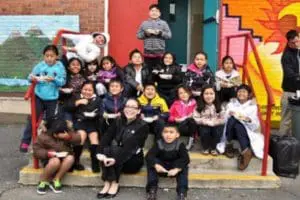Hello #eddata world! My name is Raquel Maya Carson (this is the first place where my married name is being used) and I am the inaugural teacher fellow at Data Quality Campaign. From late August to late June you can usually find me in a second-grade, dual-language classroom at Powell Elementary, a public school in DC. Prior to entering the classroom through a full-time master of arts in teaching program at Johns Hopkins University, I spent two years working in communications, helping national and federal education organizations disseminate data to the media and public.
You may see where this is going—in all honesty I love nothing more than being a part of the education sector. Over the past six years I have seen education through a variety of lenses—and I know that my calling is to be an advocate for high-quality instruction for students. I also believe that in order to do this successfully, I need to be engaged in continuous learning, networking, and collaboration.
Why Am I So Eager to Spend My Summer at the Data Quality Campaign?
Each day in the classroom, we act with a sense of urgency—everything we do has a direct impact on the educational outcomes of our students. This summer at DQC, I will attempt to bridge what is happening across the country with #eddata and try to frame it from a teacher’s perspective. For me to be able to do this successfully, I urge readers and other teachers to stay engaged in the conversation as well. In order for me to be a voice, I need to hear yours too!
My hope is that teachers across the country join in to share how student education data are used in their classroom and at their schools.Federal and state policies surrounding #eddata are beginning to take effect at the state level. However, states are still struggling with implementing policies and promoting practices to build educators’ capacity to use data. If there is one salient point that I have taken away from the classroom, it is that educators build their capacity best through collaboration and school-based support.
The goal of Data Quality Campaign is to advocate for student data to be organized and used in a way that will benefit long-term educational outcomes and performance. One organization cannot, on its own, ensure that each state is gathering the kind of data that are going to best help teachers and families support their students. But what this organization does is engage its partners, researchers, and policy analysts to create a voice for appropriate and effective data use in our school systems.
What I am here to learn is how this voice can be enhanced by what teachers and schools are already doing. With that, I’m hoping the conversation can focus on how we as teachers can make #eddata accessible and comprehensible to families and community organizations to ensure that we are providing what our students are missing and promoting where they are already excelling.
Look out for more posts from me throughout the summer!


